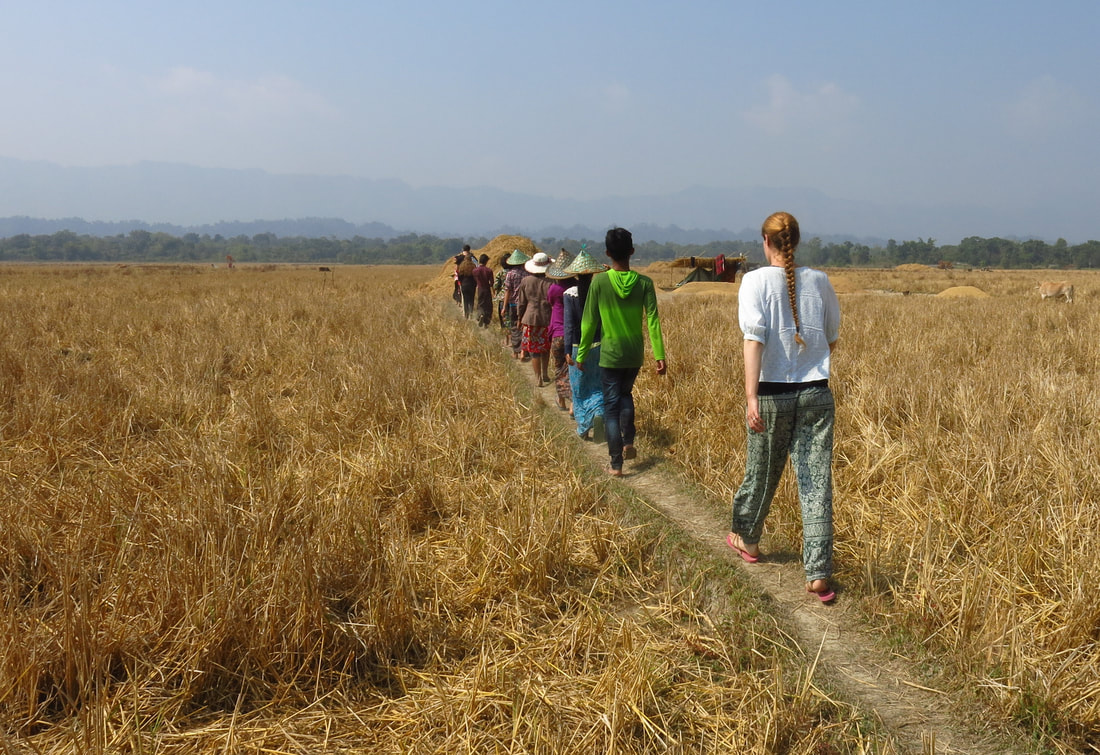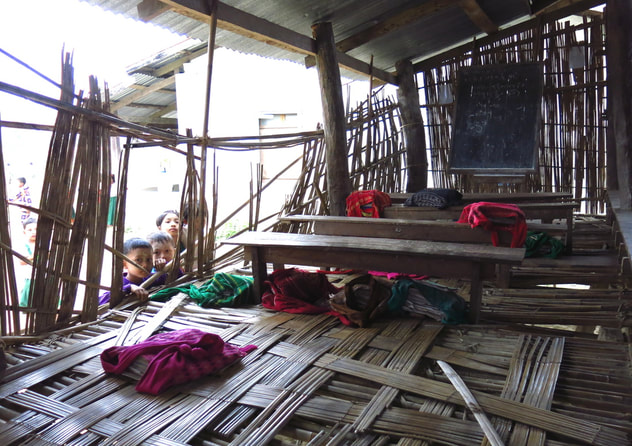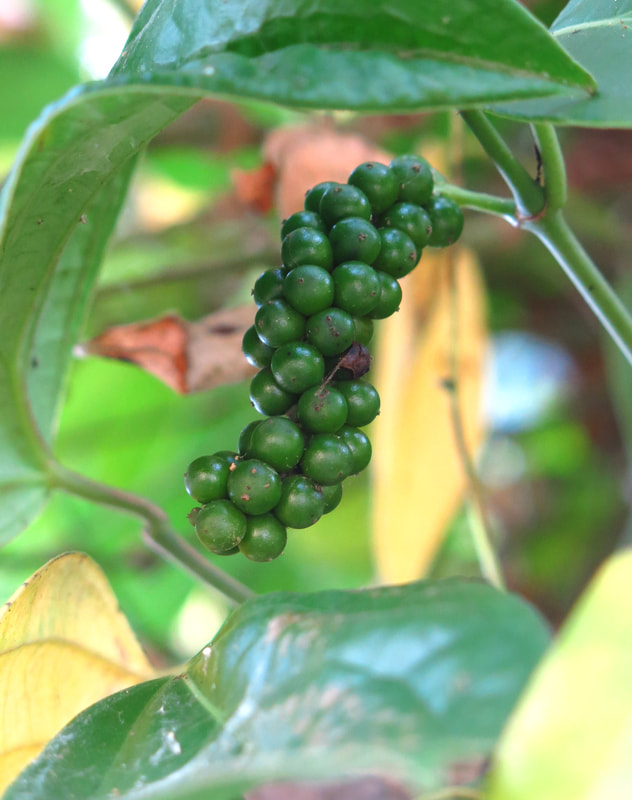|
On Friday there was a very unusual scene in the small village. Around a table sat 5 people, each with a generous bowl of rice and a smattering of curries adorning the center of the low wooden table. What’s so unusual about that? Well, 4 of those 5 people weren’t from the village, or even Myanmar. Three of the 5 were classically caucasian with light skin and hair. We were sitting with our teacher trainee while he entertained us and two other foreign guests; the director of the Chin Institute of Social Science (CISS) and his co-teacher and sister. The director, a tall thin man from St. Louis, Missouri had taught his host English in Yangon before moving to assume the role of director in Chin state, the poorest state in all of Myanmar. Van and I arrived back from R.E.C and were both surprised to be greeted with two foreign faces. The director speaks good enough Myanmar to be able to secure his own boat from Kyauktaw and they had arrived rather by surprise. The reason for their visit was not actually to see the lunchtime host, but rather to check up on another R.E.C teacher who was completing a teaching placement in a village 1.5 hours away by boat. As part of the program at CISS, participants return home to their local villages and teach in a school. As part of this undertaking, they run an election and a class president is selected. Then, the director follows-up by visiting and asking a few questions. Feedback is a huge area which NEH is focusing on, as without open honest and frank discussions about the good and the bad, it is impossible to change and grow. Therefore, Van and I were very curious to see how the feedback would be conducted; who would write what down and what questions would be asked. We had a brief discussion over lunch, but as eating isn’t the correct forum for serious matters we were content to wait and see the feedback process in action later that day. We were due to teach the volunteer teachers from 11 am until 1 pm; indeed we had arranged that I would cover class while the regular teacher manned the boat to collect the new foreigner. We didn’t need to do that though, on account of the director’s proficiency in the local language. Instead we missed the class time to eat lunch and then 25 of us pilled onto a hired barge to travel to see the school at which the CISS participant is teaching. With the girls inside and the boys on the top of the windy barge we made slow progress up the wide river. Descending en masse into the small village we headed for the local government school located next to a ramshackle villager-owned middle school where the CISS participant was teaching. Van and I stayed out of the way as the American introduced himself and asked a few questions about the elections that the class had held. There was a president of the class and a vice president to be introduced to and the students seemed to understand the concept of the elections, although they relied exclusively on translation from their local teacher. There were no notes made at the time of the interview. Upon further questioning; the young American revealed that CISS wasn’t focused on English language, and that he had been shocked at the amount of admin associated with his position, which is quite an undertaking at his youthful age of 26. The school focuses it’s efforts on social change and progressive futures for community change. Generally it is only for Chin ethnic students, but they accept a couple of R.E.C. students each year. In the evening we were fortunate to be privy to the interview process for the R.E.C students. It seems to be a process of finding motivated students whose English is good enough to study the other subjects on offer. There doesn’t seem to be a great deal of concern for motivation in the field of study; they seem to want to just recruit bright youngsters who can then be trained during the program. The next day we ventured to the forest; a fabled area to which the students have promised to take me, but until Forest Friday had not made good on. We strode out across dead paddy fields covered in yellow straw with a few open areas where local people were separating husks from rice grains. After a hot hour we reached a grassy patch with a tree reclining over a field complete with a gingerbread-looking bamboo-made cottage. All of the volunteer teachers flopped down onto the ground and set up camp; clearly hot and tired from the trek. The scenery was very picturesque; and looked more like my village in England than anything else I’ve seen here excepting one pathway covered in hedgerow. But, forest it was not. Van and I enlisted the help of our second teacher trainee who accompanied us into the forest proper. We saw pineapples and Kampot pepper just growing in nature; it was a good test of the student’s vocabulary as he searched his brain for the correct word that we might understand what we were gazing at. Van suggested undertaking the lesson we had planned, which involved 2 groups collecting items from the forest to compare using the target language of there is / there are plus countable and uncountable nouns. However, there seemed to be a general feeling of lethargy among the group and rousing anyone to perform such tasks seemed out of the question. A few of the boys played a half-energy game of football, but it was clear that this was downtime and as such an English lesson would not be well-received.
It was a pleasant excursion to the forest, but it left Van and I worried at how easy it is here for students to brush off their lesson. Because the teacher is also a friend, there is a distinct lack of authority. He describes his role as a leader not a teacher, because of the negative connotations he has with the word teacher. However, I feel that a teacher should generally be a facilitator, but also a task-master. Without encouragement, few people would chose to study over doing something ‘fun’ or ‘relaxing.’ Even with 4 foreigners present, there was very little English spoken over the course of the outing which suggests to me that the schedule needs to be tighter. I do not agree with the monk that they need 4 hours a day of teaching; I feel that this is unsustainable, and that the quality of teaching is much better than quantity. It takes novice teachers the same time to plan a lesson as to teach it; if we taught four hours per day that would be a full-time job without taking into consideration the grade 8 lessons that need to be taught or the housework that needs attending to. I think that 2 hours per day of well-planned lessons is more effective than 4 hours of unplanned class. Chloe Smith NEH Coordinator and Teacher Trainer Related Posts: Visiting a School in Kyauk Taw Life as a Harvard Graduate Student Photo Essay: Football Myanmar National Races Village Visit Donors Visit School in Thanlyin Photo Essay: Eating in Myanmar
Comments
|
This section will not be visible in live published website. Below are your current settings: Current Number Of Columns are = 3 Expand Posts Area = 1 Gap/Space Between Posts = 20px Blog Post Style = card Use of custom card colors instead of default colors = Blog Post Card Background Color = current color Blog Post Card Shadow Color = current color Blog Post Card Border Color = current color Publish the website and visit your blog page to see the results |
|
© New Education Highway 2024
Except where otherwise noted, content on this site is licensed under a Creative Commons Attribution 4.0 International License. |






